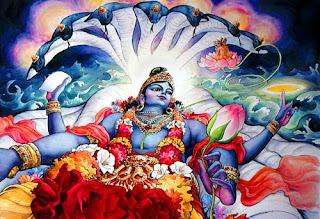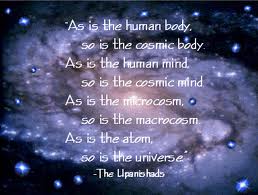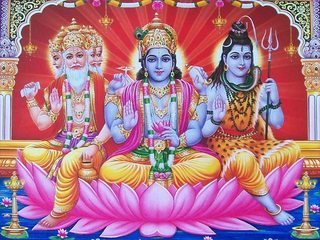Brhma sutra brhma tatparaya niryana
अथातो ब्रह्मजिज्ञासा ।। 1.1.1 । .अत्र अथशब्दः आनन्तर्यार्थः परिगृह्यते नाधिकारार्थः ब्रह्मजिज्ञासाया अनधिकार्यत्वात् मङ्गलस्य च वाक्यार्थे समन्वयाभावात् अर्थान्तरप्रयुक्त एव ह्यथशब्दः श्रुत्या मङ्गलप्रयोजनो भवति पूर्वप्रकृतापेक्षायाश्च फलत आनन्तर्याव्यतिरेकात्। सति च आनन्तर्यार्थत्वे यथा धर्मजिज्ञासा पूर्ववृत्तं वेदाध्ययनं नियमेनापेक्षते एवं ब्रह्मजिज्ञासापि यत्पूर्ववृत्तं नियमेनापेक्षते तद्वक्तव्यम्। स्वाध्यायाध्ययनानन्तर्यं तु समानम्। नन्विह कर्मावबोधानन्तर्यं विशेषः न धर्मजिज्ञासायाः प्रागपि अधीतवेदान्तस्य ब्रह्मजिज्ञासोपपत्तेः। यथा च हृदयाद्यवदानानामानन्तर्यनियमः क्रमस्य विवक्षितत्वात् न तथेह क्रमो विवक्षितः शेषशेषित्वे अधिकृताधिकारे वा प्रमाणाभावात् धर्मब्रह्मजिज्ञासयोः। फलजिज्ञास्यभेदाच्च। अभ्युदयफलं धर्मज्ञानम् तच्चानुष्ठानापेक्षम् निःश्रेयसफलं तु ब्रह्मज्ञानम् न चानुष्ठानान्तरापेक्षम् भव्यश्च धर्मो जिज्ञास्यो न ज्ञानकालेऽस्ति पुरुषव्यापारतन्त्रत्वात् इह तु भूतं ब्रह्म जिज्ञास्यं नित्यवृत्तत्वान्न पुरुषव्यापारतन्त्रम्। चोदनाप्रवृत्तिभेदाच्च। या हि चोदना धर्मस्य लक्षणम् सा स्वविषये नियुञ्जानैव पुरुषमवबोधयति ब्रह्मचोदना तु पुरुषमवबोधयत्येव केवलम् अवबोधस्य चोदनाजन्यत्वान्न पुरुषोऽवबोधे नियुज्यते यथा अक्षार्थसंनिकर्षेणार्थावबोधे तद्वत्। तस्मात्किमपि वक्तव्यम् यदनन्तरं ब्रह्मजिज्ञासोपदिश्यत इति। उच्यते नित्यानित्यवस्तुविवेकः इहामुत्रार्थभोगविरागः शमदमादिसाधनसंपत् मुमुक्षुत्वं च। तेषु हि सत्सु प्रागपि धर्मजिज्ञासाया ऊर्ध्वं च शक्यते ब्रह्म जिज्ञासितुं ज्ञातुं च न विपर्यये। तस्मात् अथशब्देन यथोक्तसाधनसंपत्त्यानन्तर्यमुपदिश्यते।।
अतःशब्दः हेत्वर्थः। यस्माद्वेद एव अग्निहोत्रादीनां श्रेयःसाधनानामनित्यफलतां दर्शयति तद्यथेह कर्मचितो लोकः क्षीयत एवमेवामुत्र पुण्यचितो लोकः क्षीयते इत्यादिः तथा ब्रह्मज्ञानादपि परं पुरुषार्थं दर्शयति ब्रह्मविदाप्नोति परम् इत्यादिः तस्मात् यथोक्तसाधनसंपत्त्यनन्तरं ब्रह्मजिज्ञासा कर्तव्या।।
ब्रह्मणो जिज्ञासा ब्रह्मजिज्ञासा। ब्रह्म च वक्ष्यमाणलक्षणम् जन्माद्यस्य यतः इति। अत एव न ब्रह्मशब्दस्य जात्याद्यर्थान्तरमाशङ्कितव्यम्। ब्रह्मण इति कर्मणि षष्ठी न शेषे जिज्ञास्यापेक्षत्वाज्जिज्ञासायाः जिज्ञास्यान्तरानिर्देशाच्च। ननु शेषषष्ठीपरिग्रहेऽपि ब्रह्मणो जिज्ञासाकर्मत्वं न विरुध्यते संबन्धसामान्यस्य विशेषनिष्ठत्वात् एवमपि प्रत्यक्षं ब्रह्मणः कर्मत्वमुत्सृज्य सामान्यद्वारेण परोक्षं कर्मत्वं कल्पयतो व्यर्थः प्रयासः स्यात्। न व्यर्थः ब्रह्माश्रिताशेषविचारप्रतिज्ञानार्थत्वादिति चेत् न प्रधानपरिग्रहे तदपेक्षितानामप्यर्थाक्षिप्तत्वात्। ब्रह्म हि ज्ञानेनाप्तुमिष्टतमत्वात्प्रधानम्। तस्मिन्प्रधाने जिज्ञासाकर्मणि परिगृहीते यैर्जिज्ञासितैर्विना ब्रह्म जिज्ञासितं न भवति तान्यर्थाक्षिप्तान्येवेति न पृथक्सूत्रयितव्यानि। यथा राजासौ गच्छति इत्युक्ते सपरिवारस्य राज्ञो गमनमुक्तं भवति तद्वत्। श्रुत्यनुगमाच्च। यतो वा इमानि भूतानि जायन्ते इत्याद्याः श्रुतयः तद्विजिज्ञासस्व तद्ब्रह्म इति प्रत्यक्षमेव ब्रह्मणो जिज्ञासाकर्मत्वं दर्शयन्ति। तच्च कर्मणिषष्ठीपरिग्रहे सूत्रेणानुगतं भवति। तस्माद्ब्रह्मण इति कर्मणि षष्ठी।।
ज्ञातुमिच्छा जिज्ञासा। अवगतिपर्यन्तं ज्ञानं सन्वाच्याया इच्छायाः कर्म फलविषयत्वादिच्छायाः। ज्ञानेन हि प्रमाणेनावगन्तुमिष्टं ब्रह्म। ब्रह्मावगतिर्हि पुरुषार्थः निःशेषसंसारबीजाविद्याद्यनर्थनिबर्हणात्। तस्माद्ब्रह्म
जिज्ञासितव्यम्।।
तत्पुनर्ब्रह्म प्रसिद्धमप्रसिद्धं वा स्यात् यदि प्रसिद्धं न जिज्ञासितव्यम्। अथाप्रसिद्धं नैव शक्यं जिज्ञासितुमिति। उच्यते अस्ति तावद्ब्रह्म नित्यशुद्धबुद्धमुक्तस्वभावं सर्वज्ञं सर्वशक्तिसमन्वितम्। ब्रह्मशब्दस्य हि व्युत्पाद्यमानस्य नित्यशुद्धत्वादयोऽर्थाः प्रतीयन्ते बृंहतेर्धातोरर्थानुगमात्। सर्वस्यात्मत्वाच्च ब्रह्मास्तित्वप्रसिद्धिः। सर्वो ह्यात्मास्तित्वं प्रत्येति न नाहमस्मि इति। यदि हि नात्मास्तित्वप्रसिद्धिः स्यात् सर्वो लोकः नाहमस्मि इति प्रतीयात्। आत्मा च ब्रह्म। यदि तर्हि लोके ब्रह्म आत्मत्वेन प्रसिद्धमस्ति ततो ज्ञातमेवेत्यजिज्ञास्यत्वं पुनरापन्नम् न तद्विशेषं प्रति विप्रतिपत्तेः। देहमात्रं चैतन्यविशिष्टमात्मेति प्राकृता जना लौकायतिकाश्च प्रतिपन्नाः। इन्द्रियाण्येव चेतनान्यात्मेत्यपरे। मन इत्यन्ये। विज्ञानमात्रं क्षणिकमित्येके। शून्यमित्यपरे। अस्ति देहादिव्यतिरिक्तः संसारी कर्ता भोक्तेत्यपरे। भोक्तैव केवलं न कर्तेत्येके। अस्ति तद्व्यतिरिक्त ईश्वरः सर्वज्ञः सर्वशक्तिरिति केचित्। आत्मा स भोक्तुरित्यपरे। एवं बहवो विप्रतिपन्ना युक्तिवाक्यतदाभाससमाश्रयाः सन्तः। तत्राविचार्य यत्किंचित्प्रतिपद्यमानो निःश्रेयसात्प्रतिहन्येत अनर्थं चेयात्। तस्माद्ब्रह्मजिज्ञासोपन्यासमुखेन वेदान्तवाक्यमीमांसा तदविरोधितर्कोपकरणा निःश्रेयसप्रयोजना प्रस्तूयते।।
ब्रह्म जिज्ञासितव्यमित्युक्तम्। किंलक्षणं पुनस्तद्बह्मेत्यत आह भगवान्सूत्रकारः..According to bhagadpad Adi Shankaracharya,atah means the discrimination between eternal and non eternal things , aversion to the enjoyment of the fruits of the work , possession of equipment and the desire for release,the knowledge for BrhmAn leads to moksha,eternal bliss and attain paramatman ,Jigansha means desire to know,for the sake of attaining immediately,he alone has to be desired and to be known by all those who are affictedWith the three miseries,h hence ,the Lord of all Is indeed the BrhmAn who forms the object of our present enquiry,purva mimasha athatha dharma jigansha( jemini purva mimasha 1.1.1) expounds the vedic ritualistic karma kand ( brhman and aryanakya granth ) deals with to celebrate the duty which leads to immortality,who knows BrhmAn,indeed he will become BrhmAn( mundaka Upanishad-3/2/9) .....desire for knowing the supreme reality,Bhrigu, Varouna’s son, came unto his father Varouna and said “Lord, teach me the Eternal.” And his father declared it unto him thus “Food and Prana and Eye and Ear and Mind—even these.” Verily he said unto him “Seek thou to know that from which these creatures are born, whereby being born they live and to which they go hence and enter again; for that is the Eternal.” And Bhrigu concentrated himself in thought and by the askesis of his brooding( tattierya Upanishad-3-1) bhirghuballi ...सर्वं खल्विदं ब्रह्म तज्जलानिति शान्त उपासीत। अथ खलु क्रतुमयः पुरुषो यथाक्रतुरस्मिल्लोके पुरुषो भवति तथेतः प्रेत्य भवति स क्रतुं कुर्वीत॥ ||१|| BrhmAn is defined in Chandogya Upanishad:- सदेव सोम्येदमग्र आसीदेकमेवाद्वितीयम्॥ तद्धैक आहुरसदेवेदमग्र आसीदेकमेवाद्वितीयं तस्मादसतः सज्जायत॥(Chandogya Upanishad 6/2/1) .....The BrhmAn is existence,knowledge , infinity,the BrhmAn is without a second excludes from himself all similar and dissimilarities,Brhman ,denotes only that which is indivisible and homogeneous...He is without parts ,he is without actions and tranquil.(sve up 6-19) ...यदा चर्मवदाकाशं वेष्टयिष्यन्ति मानवाः।
तदा देवमविज्ञाय दुःखस्यान्तो भविष्यति॥ ||१९|| ...on to the next sutras demonstrate how to know BrhmAn with the help of Scripture:- न तस्य कार्यं करणं च विद्यते न तत्समश्चाभ्यधिकश्च दृश्यते।
परास्य शक्तिर्विविधैव श्रूयते स्वाभाविकी ज्ञानबलक्रिया ||८|| his supreme power is revealed,indeed as varied , natural and as consisting of knowledge,strength and action(sve up-6/8)...The Ātman( the self ) is the BrhmAn.( Brihadaryanak Upanishad-2/5/19) इदं वै तन्मधु दध्यङ्ङाथर्वणोऽश्विभ्यामुवाच तदेतदृषिः पश्यन्नवोचद्रूपरूपं प्रतिरूपो बभूव तदस्य रूपं प्रतिचक्षणाय। इन्द्रो मायाभिः पुरुरूप ईयते युक्ता ह्यस्य हरयः शता दशेति। अयं वै हरयोऽयं वै दश च सहस्राणि बहूनि चानन्तानि च तदेतद्ब्रह्मापूर्वमनपरमनन्तरमबाह्यमयमात्मा ब्रह्म सर्वानुभूरित्यनुशासनम्॥ ||१९||... ..स वा अयमात्मा ब्रह्म विज्ञानमयो मनोमयः प्राणमयश्चक्षुर्मयः श्रोत्रमय पृथिवीमय आपोमयो वायुमय आकाशमयस्तेजोमयोऽतेजोमयः काममयोऽकाममयः (4/4/5)Why we should have a desire to know the BrhmAn:- तद्यथेह कर्मजितो लोकः क्षीयत एवमेवामुत्र पुण्यजितो लोकः क्षीयते तद्य इहात्मानमनुविद्य व्रजन्त्येताश्च सत्यान्कामास्तेषा सर्वेषु लोकेष्वकामचारो भवत्यथ य इहात्मानमनिवुद्य व्रजन्त्येताश्च सत्यान् कामास्तेषा सर्वेषु लोकेषु कामचारो भवति॥ ||६||( Chandogya Upanishad 8/1/6) Those who depart hence without having realized the Self and these true desires-for them there is no freedom in all the worlds. But those who depart hence after having realized the Self and these true desires-for them there is freedom in all the worlds...प्रणवो धनुः शरो ह्यात्मा ब्रह्म तल्लक्ष्यमुच्यते।
अप्रमत्तेन वेद्धव्यं शरवत् तन्मयो भवेत् ॥ ||४||OM is the bow and the soul is the arrow, and That, even the Brahman, is spoken of as the target. That must be pierced with an unfaltering aim; one must be absorbed into That as an arrow is lost in its target.Now the smriti texts also confirmed BrhmAna in Bhagawad gita:-यान्ति देवव्रता देवान् पितृ़न्यान्ति पितृव्रताः।
भूतानि यान्ति भूतेज्या यान्ति मद्याजिनोऽपि माम्।।9.25।intention or motive. Those who intend to worship gods, like Indra and others with the resolution, 'Let us worship Indra and other gods by ceremonies like the new moon and full moon sacrifices' - such worshippers go to Indra and other gods. Those who intend worshipping manes, resolving 'Let us worship the manes through sacrifices,' - such worshippers go to the manes or others resolving - 'Let us worship the Yaksas, Raksasas,' Pisacas and other evil spirits' - they go to them. But those who, with the same rites of worship, worship Me with the intention, 'Let us worship Lord Vasudeva, the Supreme Self, whose body is constituted of gods, the manes and the evil spirits' - they are My worshippers and they reach Me only. Those who intend worshipping gods etc., attain gods etc. After sharing limited enjoyment with them, they are destroyed with them when the time comes for their destruction. But My worshippers attain Me, who has no beginning or end, who is omniscient, whose will is unfailingly effective, who is a great ocean of innumerable auspicious attributes of unlimited excellence and whose bliss too is of limitless excellence. They do not return to Samsara. Such is the meaning. Sri Krsna continues to say, 'There is also another distinguishing characteristic of My worshippers..👌👌
Goutam blogger
अतःशब्दः हेत्वर्थः। यस्माद्वेद एव अग्निहोत्रादीनां श्रेयःसाधनानामनित्यफलतां दर्शयति तद्यथेह कर्मचितो लोकः क्षीयत एवमेवामुत्र पुण्यचितो लोकः क्षीयते इत्यादिः तथा ब्रह्मज्ञानादपि परं पुरुषार्थं दर्शयति ब्रह्मविदाप्नोति परम् इत्यादिः तस्मात् यथोक्तसाधनसंपत्त्यनन्तरं ब्रह्मजिज्ञासा कर्तव्या।।
ब्रह्मणो जिज्ञासा ब्रह्मजिज्ञासा। ब्रह्म च वक्ष्यमाणलक्षणम् जन्माद्यस्य यतः इति। अत एव न ब्रह्मशब्दस्य जात्याद्यर्थान्तरमाशङ्कितव्यम्। ब्रह्मण इति कर्मणि षष्ठी न शेषे जिज्ञास्यापेक्षत्वाज्जिज्ञासायाः जिज्ञास्यान्तरानिर्देशाच्च। ननु शेषषष्ठीपरिग्रहेऽपि ब्रह्मणो जिज्ञासाकर्मत्वं न विरुध्यते संबन्धसामान्यस्य विशेषनिष्ठत्वात् एवमपि प्रत्यक्षं ब्रह्मणः कर्मत्वमुत्सृज्य सामान्यद्वारेण परोक्षं कर्मत्वं कल्पयतो व्यर्थः प्रयासः स्यात्। न व्यर्थः ब्रह्माश्रिताशेषविचारप्रतिज्ञानार्थत्वादिति चेत् न प्रधानपरिग्रहे तदपेक्षितानामप्यर्थाक्षिप्तत्वात्। ब्रह्म हि ज्ञानेनाप्तुमिष्टतमत्वात्प्रधानम्। तस्मिन्प्रधाने जिज्ञासाकर्मणि परिगृहीते यैर्जिज्ञासितैर्विना ब्रह्म जिज्ञासितं न भवति तान्यर्थाक्षिप्तान्येवेति न पृथक्सूत्रयितव्यानि। यथा राजासौ गच्छति इत्युक्ते सपरिवारस्य राज्ञो गमनमुक्तं भवति तद्वत्। श्रुत्यनुगमाच्च। यतो वा इमानि भूतानि जायन्ते इत्याद्याः श्रुतयः तद्विजिज्ञासस्व तद्ब्रह्म इति प्रत्यक्षमेव ब्रह्मणो जिज्ञासाकर्मत्वं दर्शयन्ति। तच्च कर्मणिषष्ठीपरिग्रहे सूत्रेणानुगतं भवति। तस्माद्ब्रह्मण इति कर्मणि षष्ठी।।
ज्ञातुमिच्छा जिज्ञासा। अवगतिपर्यन्तं ज्ञानं सन्वाच्याया इच्छायाः कर्म फलविषयत्वादिच्छायाः। ज्ञानेन हि प्रमाणेनावगन्तुमिष्टं ब्रह्म। ब्रह्मावगतिर्हि पुरुषार्थः निःशेषसंसारबीजाविद्याद्यनर्थनिबर्हणात्। तस्माद्ब्रह्म
जिज्ञासितव्यम्।।
तत्पुनर्ब्रह्म प्रसिद्धमप्रसिद्धं वा स्यात् यदि प्रसिद्धं न जिज्ञासितव्यम्। अथाप्रसिद्धं नैव शक्यं जिज्ञासितुमिति। उच्यते अस्ति तावद्ब्रह्म नित्यशुद्धबुद्धमुक्तस्वभावं सर्वज्ञं सर्वशक्तिसमन्वितम्। ब्रह्मशब्दस्य हि व्युत्पाद्यमानस्य नित्यशुद्धत्वादयोऽर्थाः प्रतीयन्ते बृंहतेर्धातोरर्थानुगमात्। सर्वस्यात्मत्वाच्च ब्रह्मास्तित्वप्रसिद्धिः। सर्वो ह्यात्मास्तित्वं प्रत्येति न नाहमस्मि इति। यदि हि नात्मास्तित्वप्रसिद्धिः स्यात् सर्वो लोकः नाहमस्मि इति प्रतीयात्। आत्मा च ब्रह्म। यदि तर्हि लोके ब्रह्म आत्मत्वेन प्रसिद्धमस्ति ततो ज्ञातमेवेत्यजिज्ञास्यत्वं पुनरापन्नम् न तद्विशेषं प्रति विप्रतिपत्तेः। देहमात्रं चैतन्यविशिष्टमात्मेति प्राकृता जना लौकायतिकाश्च प्रतिपन्नाः। इन्द्रियाण्येव चेतनान्यात्मेत्यपरे। मन इत्यन्ये। विज्ञानमात्रं क्षणिकमित्येके। शून्यमित्यपरे। अस्ति देहादिव्यतिरिक्तः संसारी कर्ता भोक्तेत्यपरे। भोक्तैव केवलं न कर्तेत्येके। अस्ति तद्व्यतिरिक्त ईश्वरः सर्वज्ञः सर्वशक्तिरिति केचित्। आत्मा स भोक्तुरित्यपरे। एवं बहवो विप्रतिपन्ना युक्तिवाक्यतदाभाससमाश्रयाः सन्तः। तत्राविचार्य यत्किंचित्प्रतिपद्यमानो निःश्रेयसात्प्रतिहन्येत अनर्थं चेयात्। तस्माद्ब्रह्मजिज्ञासोपन्यासमुखेन वेदान्तवाक्यमीमांसा तदविरोधितर्कोपकरणा निःश्रेयसप्रयोजना प्रस्तूयते।।
ब्रह्म जिज्ञासितव्यमित्युक्तम्। किंलक्षणं पुनस्तद्बह्मेत्यत आह भगवान्सूत्रकारः..According to bhagadpad Adi Shankaracharya,atah means the discrimination between eternal and non eternal things , aversion to the enjoyment of the fruits of the work , possession of equipment and the desire for release,the knowledge for BrhmAn leads to moksha,eternal bliss and attain paramatman ,Jigansha means desire to know,for the sake of attaining immediately,he alone has to be desired and to be known by all those who are affictedWith the three miseries,h hence ,the Lord of all Is indeed the BrhmAn who forms the object of our present enquiry,purva mimasha athatha dharma jigansha( jemini purva mimasha 1.1.1) expounds the vedic ritualistic karma kand ( brhman and aryanakya granth ) deals with to celebrate the duty which leads to immortality,who knows BrhmAn,indeed he will become BrhmAn( mundaka Upanishad-3/2/9) .....desire for knowing the supreme reality,Bhrigu, Varouna’s son, came unto his father Varouna and said “Lord, teach me the Eternal.” And his father declared it unto him thus “Food and Prana and Eye and Ear and Mind—even these.” Verily he said unto him “Seek thou to know that from which these creatures are born, whereby being born they live and to which they go hence and enter again; for that is the Eternal.” And Bhrigu concentrated himself in thought and by the askesis of his brooding( tattierya Upanishad-3-1) bhirghuballi ...सर्वं खल्विदं ब्रह्म तज्जलानिति शान्त उपासीत। अथ खलु क्रतुमयः पुरुषो यथाक्रतुरस्मिल्लोके पुरुषो भवति तथेतः प्रेत्य भवति स क्रतुं कुर्वीत॥ ||१|| BrhmAn is defined in Chandogya Upanishad:- सदेव सोम्येदमग्र आसीदेकमेवाद्वितीयम्॥ तद्धैक आहुरसदेवेदमग्र आसीदेकमेवाद्वितीयं तस्मादसतः सज्जायत॥(Chandogya Upanishad 6/2/1) .....The BrhmAn is existence,knowledge , infinity,the BrhmAn is without a second excludes from himself all similar and dissimilarities,Brhman ,denotes only that which is indivisible and homogeneous...He is without parts ,he is without actions and tranquil.(sve up 6-19) ...यदा चर्मवदाकाशं वेष्टयिष्यन्ति मानवाः।
तदा देवमविज्ञाय दुःखस्यान्तो भविष्यति॥ ||१९|| ...on to the next sutras demonstrate how to know BrhmAn with the help of Scripture:- न तस्य कार्यं करणं च विद्यते न तत्समश्चाभ्यधिकश्च दृश्यते।
परास्य शक्तिर्विविधैव श्रूयते स्वाभाविकी ज्ञानबलक्रिया ||८|| his supreme power is revealed,indeed as varied , natural and as consisting of knowledge,strength and action(sve up-6/8)...The Ātman( the self ) is the BrhmAn.( Brihadaryanak Upanishad-2/5/19) इदं वै तन्मधु दध्यङ्ङाथर्वणोऽश्विभ्यामुवाच तदेतदृषिः पश्यन्नवोचद्रूपरूपं प्रतिरूपो बभूव तदस्य रूपं प्रतिचक्षणाय। इन्द्रो मायाभिः पुरुरूप ईयते युक्ता ह्यस्य हरयः शता दशेति। अयं वै हरयोऽयं वै दश च सहस्राणि बहूनि चानन्तानि च तदेतद्ब्रह्मापूर्वमनपरमनन्तरमबाह्यमयमात्मा ब्रह्म सर्वानुभूरित्यनुशासनम्॥ ||१९||... ..स वा अयमात्मा ब्रह्म विज्ञानमयो मनोमयः प्राणमयश्चक्षुर्मयः श्रोत्रमय पृथिवीमय आपोमयो वायुमय आकाशमयस्तेजोमयोऽतेजोमयः काममयोऽकाममयः (4/4/5)Why we should have a desire to know the BrhmAn:- तद्यथेह कर्मजितो लोकः क्षीयत एवमेवामुत्र पुण्यजितो लोकः क्षीयते तद्य इहात्मानमनुविद्य व्रजन्त्येताश्च सत्यान्कामास्तेषा सर्वेषु लोकेष्वकामचारो भवत्यथ य इहात्मानमनिवुद्य व्रजन्त्येताश्च सत्यान् कामास्तेषा सर्वेषु लोकेषु कामचारो भवति॥ ||६||( Chandogya Upanishad 8/1/6) Those who depart hence without having realized the Self and these true desires-for them there is no freedom in all the worlds. But those who depart hence after having realized the Self and these true desires-for them there is freedom in all the worlds...प्रणवो धनुः शरो ह्यात्मा ब्रह्म तल्लक्ष्यमुच्यते।
अप्रमत्तेन वेद्धव्यं शरवत् तन्मयो भवेत् ॥ ||४||OM is the bow and the soul is the arrow, and That, even the Brahman, is spoken of as the target. That must be pierced with an unfaltering aim; one must be absorbed into That as an arrow is lost in its target.Now the smriti texts also confirmed BrhmAna in Bhagawad gita:-यान्ति देवव्रता देवान् पितृ़न्यान्ति पितृव्रताः।
भूतानि यान्ति भूतेज्या यान्ति मद्याजिनोऽपि माम्।।9.25।intention or motive. Those who intend to worship gods, like Indra and others with the resolution, 'Let us worship Indra and other gods by ceremonies like the new moon and full moon sacrifices' - such worshippers go to Indra and other gods. Those who intend worshipping manes, resolving 'Let us worship the manes through sacrifices,' - such worshippers go to the manes or others resolving - 'Let us worship the Yaksas, Raksasas,' Pisacas and other evil spirits' - they go to them. But those who, with the same rites of worship, worship Me with the intention, 'Let us worship Lord Vasudeva, the Supreme Self, whose body is constituted of gods, the manes and the evil spirits' - they are My worshippers and they reach Me only. Those who intend worshipping gods etc., attain gods etc. After sharing limited enjoyment with them, they are destroyed with them when the time comes for their destruction. But My worshippers attain Me, who has no beginning or end, who is omniscient, whose will is unfailingly effective, who is a great ocean of innumerable auspicious attributes of unlimited excellence and whose bliss too is of limitless excellence. They do not return to Samsara. Such is the meaning. Sri Krsna continues to say, 'There is also another distinguishing characteristic of My worshippers..👌👌
Goutam blogger




Absolutely brilliant
ReplyDelete